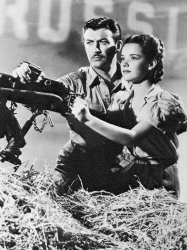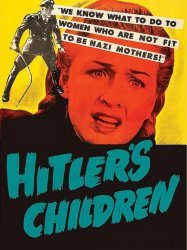Films with theme "Documentary films about World War II", sorted by revenue

Seeds of Destiny (1946)
, 20minutesDirected by David Miller
Origin USA
Genres War, Documentary
Themes Films about children, Films about racism, Films about religion, Documentary films about racism, Documentary films about law, Documentary films about war, Documentary films about historical events, Documentaire sur une personnalité, Documentary films about religion, Political films, Films about Jews and Judaism, Documentary films about World War II
Actors Ralph Bellamy

Days of Glory (1944)
, 1h26Directed by Jacques Tourneur
Origin USA
Genres Drama, War, Romance
Themes Politique, Documentary films about war, Documentary films about historical events, Political films, Documentary films about World War II
Actors Lowell Gilmore, Gregory Peck, Alan Reed, Maria Palmer, Hugo Haas, Glen Vernon
Nina Ivanova (Toumanova), a Russian dancer, becomes separated from a group sent to entertain the troops. She is found and taken to the hideout of a partisan group led by Vladimir (Peck) operating behind the German lines near the city of Tula. At first, the veteran guerrillas do not know what to make of her. Youngster Olga is astonished that she does not know how to fight, cook, mend or clean. The men, however, are entranced by her beauty.

Mrs. Miniver (1942)
, 2h14Directed by William Wyler
Origin USA
Genres Drama, War, Romance
Themes Films about families, Politique, Transport films, Aviation films, Documentary films about war, Documentary films about historical events, Political films, Documentary films about World War II
Actors Greer Garson, Walter Pidgeon, Teresa Wright, Richard Ney, May Whitty, Reginald Owen
Kay Miniver (Greer Garson) and her family live a comfortable life at a house called 'Starlings' in Belham, a fictional village outside London. The house has a large garden, with a private landing stage on the River Thames at which is moored a motorboat belonging to her devoted husband Clem (Walter Pidgeon), a successful architect. They have three children: the youngsters Toby (Christopher Severn) and Judy (Clare Sandars) and an older son Vin (Richard Ney) a student at a university. They have live-in staff: Gladys (Brenda Forbes) the housemaid and Ada (Marie De Becker) the cook.

49th Parallel (1941)
, 2h3Directed by Michael Powell
Origin United-kingdom
Genres Drama, War, Thriller, Adventure
Themes Seafaring films, Politique, Prison films, Transport films, Aviation films, La bataille de l'Atlantique, Documentary films about war, Documentary films about historical events, Political films, Documentary films about World War II
Actors Leslie Howard, Laurence Olivier, Raymond Massey, Raymond Lovell, Niall MacGinnis, Anton Walbrook
Early in the Second World War, U-37, a German U-boat, makes its way to Canadian waters and participates in the Battle of the St. Lawrence. It succeeds in evading an RCAF patrol and moves north. While a raiding party of six Nazi sailors is put ashore in an attempt to obtain supplies, the U-boat is sunk in Hudson Bay. The six attempt to evade capture by traveling across Canada to the still-neutral United States.

Song of Russia (1944)
, 1h47Directed by Gregory Ratoff, László Benedek
Origin USA
Genres Drama, War, Musical, Romance
Themes Films about music and musicians, Documentary films about war, Documentary films about historical events, Films about classical music and musicians, Musical films, Political films, Documentary films about World War II
Actors Robert Taylor, Susan Peters, Robert Benchley, John Hodiak, Felix Bressart, Michael Chekhov
American conductor John Meredith (Robert Taylor) and his manager, Hank Higgins (Robert Benchley), go to Russia shortly before the Nazi invasion of the Soviet Union. Meredith falls in love with beautiful Soviet pianist Nadya Stepanova (Susan Peters) while they travel throughout the country on a 40-city tour. Their bliss is destroyed by the German invasion.

Wake Island (1942)
, 1h27Directed by John Farrow, Hal Walker, Harve Foster
Origin USA
Genres Drama, War, Action
Themes Seafaring films, Transport films, Aviation films, Documentary films about war, Documentary films about historical events, Political films, Documentary films about World War II, United States Armed Forces in films
Actors Brian Donlevy, Robert Preston, William Bendix, Macdonald Carey, Albert Dekker, Walter Abel
The film's opening credits state that the screenplay was written by W.R. Burnett and Frank Butler "From the Records of The United States Marine Corps", and includes many Marine Corps and military advisers. It also states that "In this picture, the action at Wake Island has been recorded as accurately as possible. However, the names of the characters are fictional and any similarity to the personal characteristics of the officers and men of the detachment is not intended." This is likely because the actual events were unfolding during the production of the film, and names were being protected.

Hitler's Children (1943)
, 1h22Directed by Edward Dmytryk, Irving Reis
Origin USA
Genres Drama, War, Romance
Themes Politique, Documentary films about war, Documentary films about historical events, Political films, Documentary films about World War II
Actors Tim Holt, Bonita Granville, Kent Smith, Otto Kruger, H. B. Warner, Lloyd Corrigan
In 1933 Berlin, Professor Nichols (Smith) runs the American Colony School. It is next to the Horst Wessel School, where young Germans are indoctrinated into Nazism. During a brawl between the student bodies, Karl Bruner (Holt), a German youth born in the United States, objects when Anna Muller (Granville), a US citizen born in Germany, smacks him with her baseball bat. The students are attracted to each other despite this beginning. Anna's parents had sent her to Germany to be educated, although they allowed her to go to the American school. Soon, the professor, Anna, and Karl become good friends, though they do not agree politically. After a while though, they lose touch with each other.

D-Day: Normandy 1944 (2014)
, 40minutesOrigin France
Genres War, Documentary, Historical
Themes Documentary films about war, Documentary films about historical events, Documentary films about World War II
Actors François Cluzet
6 juin 1944: La plus grande opération alliée de la Seconde Guerre mondiale a commencé en Normandie.

Hitler: The Last Ten Days (1973)
, 1h46Directed by Ennio De Concini
Origin Italie
Genres Drama, Science fiction, War, Thriller, Biography, Historical
Themes Documentary films about war, Documentary films about historical events, Documentaire sur une personnalité, Hitler, Political films, Documentary films about World War II
Actors Alec Guinness, Simon Ward, Adolfo Celi, Diane Cilento, Gabriele Ferzetti, Doris Kunstmann
The film opens with Hitler's 56th birthday on 20 April 1945, and ends 10 days later, with his suicide on 30 April.

Paper Clips (2004)
, 1h22Origin USA
Genres Documentary
Themes Films about education, Films about racism, Films about religion, Documentary films about racism, Documentary films about law, Documentary films about war, Documentary films about historical events, Documentary films about religion, Political films, Films about Jews and Judaism, Documentary films about World War II
Actors Tom Bosley
Paper Clips takes place in the rural, blue-collar Tennessee community of Whitwell, where a middle-school class attempts to gauge the magnitude of World War II's Holocaust by collecting paper clips, each of which represents a human life lost in the Nazis' slaughter of Jews. The idea came in 1998 from three of the teachers at the school and was completed in their eighth grade classrooms. The students ultimately succeeded in collecting over 25 million paperclips.

We've Never Been Licked (1943)
, 1h43Directed by John Rawlins
Origin USA
Genres Drama, Romance
Themes Transport films, Aviation films, Documentary films about war, Documentary films about historical events, Political films, Documentary films about World War II
Actors Richard Quiney, Noah Beery, Jr, Anne Gwynne, Martha O' Driscoll, Robert Mitchum, William Frawley
Army brat Brad Craig enters A&M with a chip on his shoulder which upperclassmen quickly knock off. Once adjusted, Craig falls in love with a professor's beautiful daughter, only to find she is in love with his roommate. In the meantime, Craig unwittingly associates with Japanese spies (one played by William Frawley of I Love Lucy) bent on stealing a secret chemical compound developed in the A&M Chemistry Department. Craig is drummed out of the Corps for being a suspected accomplice to the spies, but he then bravely infiltrates the spy network to sabotage the Japanese war effort. Many A&M traditions are referenced in this film.

Invisible Agent (1942)
, 1h21Directed by Edwin L. Marin
Origin USA
Genres Science fiction, War, Comedy, Adventure, Spy, Horror, Romance
Themes Spy films, Politique, Films based on science fiction novels, Documentary films about war, Documentary films about historical events, Political films, Documentary films about World War II, Invisibilité
Actors Ilona Massey, Jon Hall, Peter Lorre, Cedric Hardwicke, Albert Bassermann, J. Edward Bromberg
The grandson of Dr. Jack Griffin, the original invisible man, has emigrated to the United States and now runs a print shop in Manhattan under the assumed name of Frank Raymond (Jon Hall). In his shop he is confronted by four armed men who reveal that they know his true identity. One of the men, Conrad Stauffer (Cedric Hardwicke), is a lieutenant general of the S.S., while a second, Baron Ikito (Peter Lorre), is Japanese. They offer to pay for the invisibility formula and threaten amputation if it is not revealed. Griffin manages to escape with the formula in his hands.

Victory Through Air Power (1943)
, 1h5Directed by Hal Roach, H. C. Potter, Charles Monroe Schulz, Clyde Geronimi, Fred Moore, Franklin Thomas, James Algar, Perce Pearce, Jack Kinney
Origin USA
Genres War, Documentary, Animation
Themes Politique, Transport films, Aviation films, Documentary films about war, Documentary films about historical events, Documentary films about technology, Political films, Documentary films about World War II, Children's films
Actors Art Baker
Le fait débute par un rappel historique. Il évoque les controverses liées au Général William Mitchell, pionnier de l'aviation militaire entre 1919 et 1936, année de sa mort. Il militait pour le développement d'une aviation ayant des bombardiers, mais sa hiérarchie croyait en la supériorité de la marine de guerre. En 1925, il fut même rétrogradé comme colonel.
 , 1h31
, 1h31Directed by Errol Morris
Origin USA
Genres Drama, Documentary
Themes Prison films, Films about racism, Films about religion, Documentary films about racism, Documentary films about law, Documentary films about war, Documentary films about historical events, Documentaire sur une personnalité, Documentary films about religion, Political films, Films about capital punishment, Films about Jews and Judaism, Documentary films about World War II, Documentary films about law enforcement, Négationnisme
Actors Errol Morris
Using film made at American prisons, Leuchter talked about his upbringing where his father was a corrections officer. Through his family associations, young Leuchter claimed he was able to witness an execution performed in an electric chair. Leuchter's impression of the event was that the electric chairs used by American prisons were unsafe and often ineffective. The event led him to design modifications to the device that were adopted by many American states.
 , 1h42
, 1h42Directed by Michael Powell, Emeric Pressburger
Origin United-kingdom
Genres Drama, War, Action
Themes Politique, Transport films, Aviation films, Documentary films about war, Documentary films about historical events, Political films, Documentary films about World War II, Disaster films, Films about aviation accidents or incidents
Actors Godfrey Tearle, Eric Portman, Hugh Williams, Bernard Miles, Hugh Burden, Emrys Jones
"B for Bertie" is an RAF Vickers Wellington bomber whose crew was forced to bail out over the Netherlands near the Zuider Zee after one of their engines was damaged during a nighttime raid on Stuttgart. Five of the six airmen find each other; the sixth goes missing. The first Dutch citizens they encounter, led by English-speaking schoolteacher Else Meertens (Pamela Brown), are suspicious at first as no aircraft is reported to have crashed in the Netherlands (the abandoned bomber actually reaches England before hitting a pylon). After much debate and some questioning, the Dutch agree to help, despite their fear of German reprisals.
 Connection
Connection